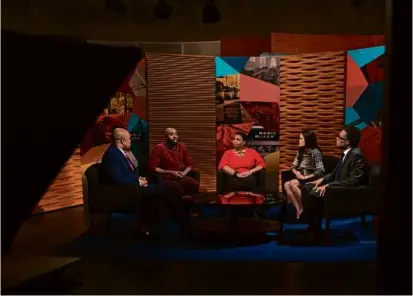Loss of Pioneering TV Program Leaves Void in Black Community Discourse

In a significant shift that reverberates beyond television screens, the departure of “Basic Black,” a longstanding staple of public broadcasting in Boston, marks a poignant loss for the city’s communities of color. Originally christened “Say Brother” upon its inception in 1968, the program stood as a beacon for inclusive dialogue, exploring issues pertinent to people of color with a depth and nuance often absent from mainstream media.
With segments ranging from the economic impact of the pandemic on minority-owned businesses to the challenges faced by black women in accessing breast cancer treatment, “Basic Black” cultivated a platform where underrepresented voices could be heard and issues explored. Its suspension by GBH, announced as part of cost-saving measures, signals an end to an era of community-centered programming.
Longtime viewers and contributors lament the void left by the show’s absence, fearing that its unique brand of programming may not find a home elsewhere. Michael Curry, Chief Executive of the Massachusetts League of Community Health Centers and former president of the Boston branch of the NAACP, reflects the sentiments of many, stating, “We relied on ‘Basic Black’ for years to have our perspective.”
While GBH has pledged to reinvent the program in a digital-first format, the decision to suspend its television broadcast underscores shifting audience behaviors and financial realities. Susan Goldberg, GBH’s Chief Executive, emphasized the necessity of ceasing production due to declining viewership, a sentiment echoed by industry-wide challenges faced by media organizations grappling with budget deficits and evolving consumer preferences.
Despite assurances of a digital revival, concerns linger regarding the show’s future incarnation. Questions surrounding staffing, concrete plans, and the preservation of its legacy remain unanswered, prompting apprehension among both current and former employees.
The significance of “Basic Black” transcends its immediate impact on television. As Kim Mclarin, a former host of the program, notes, it served as a conduit for dialogue and understanding across racial and cultural divides. Its absence, particularly amidst a backdrop of societal upheaval and polarization, leaves a void in the fabric of public discourse.
As media outlets navigate an increasingly turbulent landscape, Mclarin implores them to prioritize their role as stewards of democracy and champions of inclusivity. In her view, the pursuit of profit should not overshadow the imperative to serve diverse communities and foster informed citizenship.
In the wake of “Basic Black’s” departure, its legacy endures as a testament to the power of inclusive media and the enduring need for platforms that amplify marginalized voices. While the future of the program remains uncertain, its impact on Boston’s cultural landscape and beyond resonates as a testament to its enduring significance.












